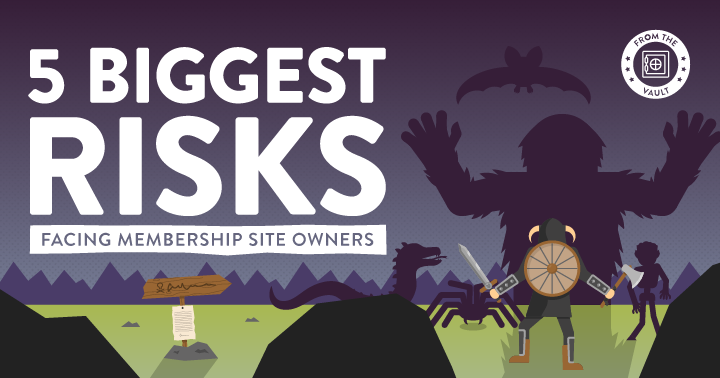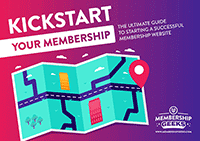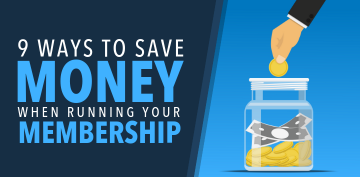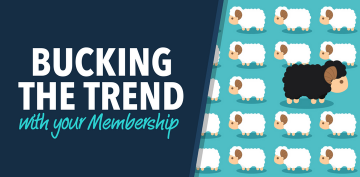Running a membership website can be one of the most rewarding experiences…
You become recognized as an authority within your niche, build a loyal community, and a successful business in the process…
But just like any business, it’s not without challenges. In fact, there are some serious membership risks that every site owner needs to be aware of if they want to grow and maintain a successful membership long term.
From security issues to content theft and platform dependencies, overlooking these potential pitfalls can have a significant impact on your business.
So in this article, we’re covering five of the biggest membership risks you might face—and more importantly, how to avoid them.
1. Third-party platform related risks
This isn't going to apply to every membership site owner…
But if you've followed us for a while you'll have heard us rail against the idea of building your membership on rented land i.e. On a third-party site, such as Facebook.
While resisting the urge to dive into the whole Facebook group vs forum debate for your community….
The main membership risk to be aware when it comes to third party platforms like Facebook or hosted platforms is that you aren’t in control.

You opting for self-hosted platforms for your website…
If they suddenly decide that the features you’re using don’t match their terms and conditions or the direction of their business…
They're well within their rights to shut things down overnight…
That's the risk you take when using them…
And while this could happen on self-hosted platforms, it’s far less likely…
You have some assurance that your content and community are safe with them.
When it comes to managing membership site risks, owning your digital infrastructure is a big step toward long-term stability.
2. Security and hacking
Security is a non-negotiable for online businesses, and membership risks around cybercrime are on the rise.
We’re talking about anything from your website being defaced with offensive messaging to malicious attacks.
Memberships are practically a treasure trove for cybercriminals as a whole…
Why? Because your site most likely processes lots of personal data…
And the fact that you take payments makes your site a more attractive target than a typical blog or brochure website.
As your business grows, the chances are your team will too…
And when you give admin or moderator access to more people, this increases the risk to your business…
It means there are more avenues for potential hackers to take advantage of.
While this is all quite dire, keeping your membership site secure is important…
If you use WordPress, get security plugins and the best possible firewall or other security functionality…
Don’t overlook this key membership risk, even if your site is still small. Prevention is a lot cheaper than damage control.
3. Idea theft
Another common membership risk is having your content copied or repurposed without your permission. Once your ideas are out there – online or otherwise – there’s always a chance they’ll get ripped off.
That’s a harsh reality that content creators in all fields need to come to terms with…
And in most cases, you don't have a great deal of control over who actually sees your content unless you have it locked down.
So, there’s always the chance that someone will see what you’ve put out there…
And either innocently or nefariously duplicate it.
The tricky thing here is that it’s all down to interpretation…
It’s not unheard of for two people to independently come up with similar concepts, styles, or phraseology…
So, before you take any action, first have a conversation with an impartial third party to check if it could be a coincidence.
There’s nothing like fresh eyes to really pinpoint whether there’s a valid connection.
But if you do see someone outright stealing your membership content, make sure you jump on it straight away…
Don't let it slide…
But by the same token, don't get hostile right away…
Reach out to the offending party and let them know it's similar or a like-for-like copy and request they take it down before moving forward taking alternative action.

Approach without hostility…
One thing you should keep in mind is that this is mostly unavoidable.
So, while it’s advisable to keep an eye out for plagiarism, don’t get stuck chasing it to the extent that you stop serving your audience…
Keep innovating and moving forward with your business.
4. Illegal downloading and sharing
Content theft isn’t always about idea plagiarism—sometimes it’s just flat-out piracy.
One of the more frustrating membership risks is people illegally downloading and sharing your premium content. A scourge that even billion-dollar industries like Hollywood still don’t have a lid on…
And if they can't stamp out piracy, what chance do we have?
However, a silver lining is that the number of people who attempt to do this is such a minuscule portion of your audience.
While it’s a risk, it certainly isn’t enough of a reason not to have a positive refund policy or run a trial period.
Hit and runs are inevitable, so try not to withhold certain elements from the majority of your members based on the actions of the few.
Instead, you can tweak certain features to ensure that this kind of thing isn’t easy to do…
For instance, you could ensure that your video content isn’t downloadable on the site…
Or you could look for ways to drip feed your membership content.
Watermarks also come in handy, so in the event that your content is illegally downloaded, all roads lead back to your site.
Try not to overcomplicate things with preventative measures to the point where it becomes a painful experience for your paying members.
5. Having a membership that relies primarily or solely on content
Here’s a membership risk that many creators fall into without realizing it: depending too much on content to deliver value.
Yes, content matters. But if your membership is essentially just a content library, it becomes easy to replicate—and even easier to replace.
Now, we always talk about memberships as comprising of essentially the three Cs – Content, Coaching, and Community.
But if you look around, you’ll notice that so many memberships lean too heavily on the content side of things…
So, the mindset here is that content is the real selling point…
This isn’t wrong exactly, but there is one flaw to this approach…
In doing this, you expose yourself to someone potentially offering content of equal or greater value for free.
Picture a business owner with a fitness membership site where they teach people everything from workout routines to diet plans with a monthly charge on that.
Then along comes another entrepreneur with a fitness app and a little something else – the same quality and style of content you offer – but they’re giving it away for free.
This is why building a community and coaching your members are so vital.
It's important to put some effort into adding that personal touch to your membership.
If people can connect to you and you can offer more than just content, it’s a lot harder for people to run off towards something else.
Final Thoughts on Managing Membership Risks
No membership site is immune to challenges, but knowing the most common membership risks puts you in a better position to avoid them—or handle them when they arise.
From protecting your platform and securing your site to diversifying your value and preparing for the unexpected, proactive planning is key to building a sustainable business.
So take some time this week to review your setup and see where you might be exposed to risk—and what changes you can make to better protect your membership and your members.





